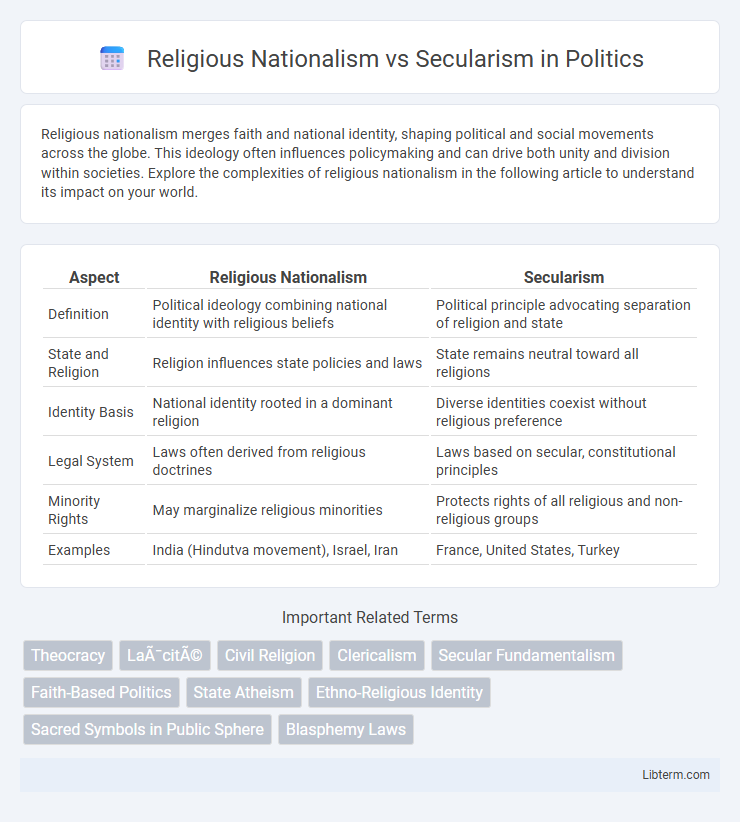Religious nationalism merges faith and national identity, shaping political and social movements across the globe. This ideology often influences policymaking and can drive both unity and division within societies. Explore the complexities of religious nationalism in the following article to understand its impact on your world.
Table of Comparison
| Aspect | Religious Nationalism | Secularism |
|---|---|---|
| Definition | Political ideology combining national identity with religious beliefs | Political principle advocating separation of religion and state |
| State and Religion | Religion influences state policies and laws | State remains neutral toward all religions |
| Identity Basis | National identity rooted in a dominant religion | Diverse identities coexist without religious preference |
| Legal System | Laws often derived from religious doctrines | Laws based on secular, constitutional principles |
| Minority Rights | May marginalize religious minorities | Protects rights of all religious and non-religious groups |
| Examples | India (Hindutva movement), Israel, Iran | France, United States, Turkey |
Understanding Religious Nationalism
Religious nationalism combines religious identity with national identity, influencing political policies and social cohesion in numerous countries. It often promotes the idea that the nation's culture and laws should reflect the dominant religion's values, shaping legislation and public life. This ideology contrasts with secularism, which advocates for the separation of religion from governmental institutions and policies to ensure religious neutrality and pluralism.
Defining Secularism in Modern Societies
Secularism in modern societies refers to the principle of separating religious institutions from state governance, ensuring that public policies and laws remain neutral towards all religions. This framework promotes equal rights and freedoms for individuals regardless of their religious beliefs, fostering social cohesion and preventing religious dominance in political affairs. By emphasizing rational governance based on universal human rights and scientific reasoning, secularism supports pluralism and protects minority groups from sectarian influences.
Historical Roots of Religious Nationalism
Religious nationalism traces its roots to the fusion of faith and identity during periods of colonial resistance and nation-building, where religion served as a unifying force against foreign rule. Movements such as Hindu nationalism in India and Zionism in Israel historically leveraged religious narratives to consolidate political identity and mobilize mass support. This intertwining of religion and nationalism contrasts sharply with secularism's emphasis on separating religious institutions from state governance to ensure pluralistic and democratic frameworks.
The Rise of Secularism: Key Movements and Moments
The rise of secularism is marked by pivotal movements such as the Enlightenment, which championed reason and individual rights over religious authority, and the French Revolution, which institutionalized state secularism through laicite. Key moments include the establishment of the United States Constitution's First Amendment, ensuring the separation of church and state, and Turkey's Kemalist reforms promoting secular governance. These events collectively shifted power from religious institutions to secular governments, reshaping modern political and social landscapes.
Impact of Religious Nationalism on Politics
Religious nationalism significantly shapes political landscapes by intertwining faith with governance, often leading to policies that prioritize a particular religious identity over secular pluralism. This fusion can intensify social divisions, marginalizing minority groups and influencing voter behavior through faith-based appeals. The political mobilization around religious nationalism frequently challenges secular principles, affecting legislative processes and democratic freedoms in diverse nations.
Secularism and the Separation of Church and State
Secularism emphasizes the separation of church and state to ensure that religious institutions do not influence government policies and laws, preserving religious freedom for all citizens. This principle supports a pluralistic society where governance is based on rational, inclusive, and non-religious foundations, preventing favoritism towards any single religion. Governments that adopt secularism prioritize equal treatment of diverse beliefs, maintaining social harmony and protecting individual rights from religious interference.
Social Consequences of Religious Nationalism
Religious nationalism often intensifies social divisions by prioritizing a specific religious identity over inclusive civic values, leading to increased communal tensions and marginalization of minority groups. It can erode pluralistic traditions and undermine social cohesion by fostering exclusion and legitimizing discrimination based on religious affiliations. Social consequences include polarization, reduced social trust, and challenges to democratic institutions due to the intertwining of religion with nationalist political agendas.
Challenges Faced by Secular Societies
Secular societies often face challenges such as managing religious diversity while ensuring equal rights and freedoms for all citizens, regardless of faith. The rise of religious nationalism can lead to social polarization and pressure on secular principles, complicating governance and public policy. Balancing freedom of religion with the state's secular nature requires constant vigilance to prevent religious dominance in politics and law.
Balancing Faith and Governance
Religious nationalism challenges secularism by intertwining religious identity with state governance, often influencing laws and policies based on faith-based principles. Secularism advocates for the separation of religion and state to ensure equal rights and freedoms for diverse populations irrespective of religious beliefs. Balancing faith and governance requires frameworks that respect religious diversity while upholding constitutional principles, safeguarding democratic institutions from sectarian dominance.
The Future of Religious Nationalism vs Secularism
Religious nationalism continues to evolve as it intersects with global political trends, influencing state policies and cultural identities in numerous countries. As secularism faces challenges from rising religiously motivated political movements, the balance between religious influence and secular governance will shape future socio-political landscapes. The trajectory of religious nationalism versus secularism will largely depend on how governments manage religious diversity and uphold secular principles in increasingly polarized societies.
Religious Nationalism Infographic

 libterm.com
libterm.com